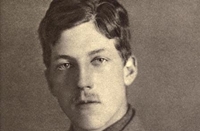 The British assault on the small Flemish town of Loos on 25 September 1915 was one of the least glamorous episodes of the First World War. It is notorious for the first use of poison gas by the British. In fact the gas drifted back and some of the world’s first casualties of chemical warfare were thus British troops. A shortage of ammunition for the artillery bombardment meant that the infantry advance was a bloodbath. By the end of the first day, of 10,000 British soldiers who attacked German defences over 8,000 were dead or wounded. Three weeks of futile attack and counter-attack followed without an inch of ground gained. On 16 October a German sniper got his chance and shot a twenty-year-old British Captain through the head. In his knapsack 37 poems were found. His name, Charles Sorley.
The British assault on the small Flemish town of Loos on 25 September 1915 was one of the least glamorous episodes of the First World War. It is notorious for the first use of poison gas by the British. In fact the gas drifted back and some of the world’s first casualties of chemical warfare were thus British troops. A shortage of ammunition for the artillery bombardment meant that the infantry advance was a bloodbath. By the end of the first day, of 10,000 British soldiers who attacked German defences over 8,000 were dead or wounded. Three weeks of futile attack and counter-attack followed without an inch of ground gained. On 16 October a German sniper got his chance and shot a twenty-year-old British Captain through the head. In his knapsack 37 poems were found. His name, Charles Sorley.
The roll-call of poets protesting against the squander of life in the trenches is long and illustrious, headed by Thomas Hardy and Wilfred Owen. Rupert Brooke’s “corner of a foreign field” and Lawrence Binyon’s “For the Fallen” have become icons of remembrance embedded in the national psyche. Siegfried Sassoon, Robert Graves and Edward Thomas remain popular. Sorley, though, has faded from view, remembered mainly through the beautiful musical setting of his poem Expectans Expectavi by Charles Wood, one of the standards of Anglican choral repertoire. At the time, however, he achieved considerable acclaim. His only collection of poems, published posthumously in 1916, went through six editions. The Poet Laureate, John Masefield, said Sorley was “the greatest poet lost in the War”. Wilfred Owen wrote the epitaph on his memorial at Poets Corner in Westminster Abbey. He was a particular favourite of Donald Coggan, Archbishop of Canterbury (1974 – 1980).
Unlike Owen or Sassoon who gave us searing images of the slaughter (“no passing bell for those who die as cattle”), Sorley’s poems are reflective, ambivalent, philosophical. The closest he comes to is describing the carnage is in his last poem:
When you see millions of the mouthless dead
Across your dreams in pale battalions go
Say not soft things.
When You See Millions Of The Mouthless Dead (1915)
but the poem’s main intent seems to be to warn against sentimentalising the dead
Say only this, “They are dead”.
At the outbreak of the war Sorley was studying at the University of Jenna in Germany and had developed a love of Germany and its culture. He detested the jingoism and demonising of Germany which Lord Kitchener used to whip up enthusiasm for the war. He described his stance as “unenthusiastic patriotism” and saw the war as deplorable but necessary to limit the Kaiser’s megalomania. “Serving one’s country is”, he wrote to a friend, “so unpicturesque and unheroic when it comes to the point”. If these views were heretical at the time, his poem “To Germany” now strikes a visionary note of reconciliation
“When it is peace, then we may view again
With new-won eyes each other’s truer form
And wonder. Grown more loving-kind and warm
We’ll grasp firm hands and laugh at the old pain,
When it is peace. But until peace, the storm
The darkness and the thunder and the rain.
To Germany (1914) extract
Thanks to Wood, his best-known poem now is Expectans Expectavi. The title refers to Psalm 40 “I waited patiently for the Lord” (RSV). It finishes with these three beguiling stanzas, offering an extraordinary image of what scripture calls “the heart”, not the beating organ, but the centre of our being:
I have a temple I do not
Visit, a heart I have forgot,
A self that I have never met,
A secret shrine — and yet, and yet
This sanctuary of my soul
Unwitting I keep white and whole,
Unlatched and lit, if Thou should’st care
To enter or to tarry there.
With parted lips and outstretched hands
And listening ears Thy servant stands,
Call Thou early, call Thou late,
To Thy great service dedicate.
There is a depth and maturity in these words which is remarkable in someone so young. Patiently waiting for God maybe the primary labour of the spiritual life, but it’s often a lesson that comes in later years. Sorley recognises this – “I do not visit” – but is nevertheless aware of what he neglects. His language is simple and exquisitely chosen. Look how “And yet, and yet” bridges the two verses and also introduces a reflective tone, slowing down the rhythm of the short rhyming couplets. Perhaps the most powerful word is “unwitting”. It suggests that our hearts will always be ready – “unlatched and lit” – without any conscious effort on our part and that we need to do nothing to prepare for God to visit other than “stand”. This is a notion which is profoundly comforting and theologically astute.
To speculate on what Sorley might have written had be survived the horrors of Loos is futile. But let’s allow him to remind us that the millions who lost their lives, on both side, were human beings longing for peace, not cattle.
Simon Keyes
